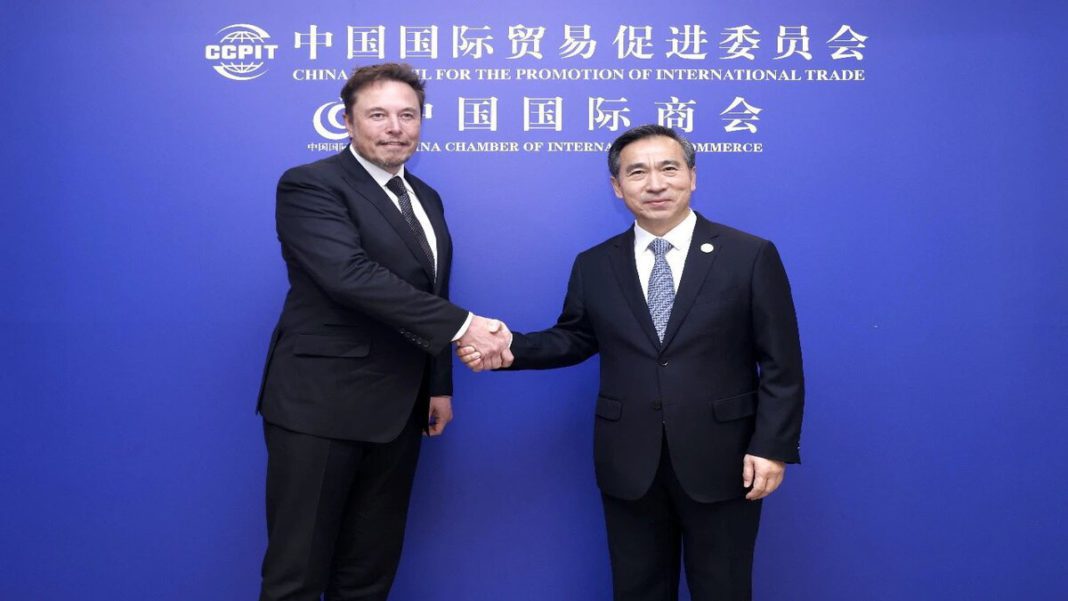CHINA: A veritable parade of foreign CEOs, including Tesla’s Elon Musk and Goldman Sachs’ David Solomon, have travelled to a reopened China in the last few months.
One notable common thread is that they haven’t discussed much in public about their trips, which have mainly consisted of meetings with local staff, government representatives, and business partners.
Media appearances and public events, once frequent prior to the pandemic, are now rare. Even Musk, who is renowned for his frank banter on Twitter, was unusually quiet during a quick trip last week.
The billionaire performed a stage dance in front of the media in 2020 to mark the arrival of the first vehicles produced at Tesla’s Shanghai plant.
This time, the press was not invited to cover his visit to the plant. Musk didn’t tweet once while he was in China, despite having mentioned the trip in two posts after returning.
Goldman’s Solomon has also been less showy. He spoke with the media and took part in a number of forums in 2019. However, his only known engagements on his trip in March of this year were talks behind closed doors with regulators, China’s sovereign wealth fund, and at a university.
Senior staff at chambers of commerce and trade associations noted that the absence of information from Western CEOs and their companies about the trips to China can be attributed to caution given that U.S.-Sino political and trade tensions have deteriorated to their lowest point in decades.
President Xi Jinping’s increased focus on national security, especially in light of the recent crackdown on consultancies and due diligence agencies, has left many multinational firms uncertain about where they might cross the line of the law, they stated.
The managing director of the Canada-China Business Council, Noah Fraser, said visiting CEOs are no longer seeking out new business possibilities but instead are focusing on maintaining current relationships and will frequently demand no press, fancy dinners, or speaking engagements.
They seem to be keeping “their heads down and will have private lunches where they can learn from people on the ground what’s happening,” he stated.
Before making their way to China, U.S. CEOs have been looking for advice regarding how Beijing’s expansion of its counter-espionage statute could affect them, as per the head of a U.S. trade association, who refused to be identified due to the sensitivity of doing business in China at the moment.
The CEOs also wanted to know how to cope with Chinese government officials and queries once the trip became public, the organisation head stated, adding that it was not in the CEOs’ best interests to speak to the media and run the danger of being asked to comment on views taken by Washington and Beijing.
The EU Chamber of Commerce stated in a statement that businesses operating in China have always exercised some level of prudence and are now adjusting to changes in areas that might be considered sensitive. Goldman declined to comment, while Tesla did not respond to a request for comment.
China’s foreign ministry stated that frequent visits from American CEOs were seen as a “vote of confidence” in the Chinese economy. It said that the U.S. government’s “wrong policy” of restricting China was the reason why their trips were so low-key.
It also stated that China had the right to protect its national security through domestic legislation in response to concerns regarding its counter-espionage statute. The American Department of Commerce declined to respond.
While US President Joe Biden stated last month that he anticipated a thaw in tense relations with Beijing “very shortly”, there is no doubt that tensions have escalated this year, with flashpoints including U.S. export restrictions on semiconductors and worries about data security.
However, international CEOs seem eager to learn the lay of the land following three years of strict COVID bans that prevented access to China.
Those who have travelled here in recent months include Apple’s Tim Cook, General Motors’ Mary Barra, Intel’s Patrick Gelsinger, JPMorgan’s Jamie Dimon, and Blackstone’s Stephen Schwarzman.
This year, the high-profile China Development Forum saw the participation of 67 foreign business leaders, which is still 20 fewer than in 2019.
Christopher Johnson, head of China Strategies Group, a political risk consultancy, said that “the idea is that you have to show sufficient commitment to the China market if you’re playing there.”
At the same time, he continued, the CEOs must do so “without setting off alarm bells with the U.S. government, and it’s a very difficult task.”
Blackstone and JPMorgan declined to comment. Requests for comment from Apple, Intel, and General Motors went unanswered. The few known statements made by foreign CEOs while they were in China have been consistent with Vice President Biden’s position that he is not trying to separate the two biggest economies in the world.
The foreign ministry cited Musk as stating he was opposed to a decoupling of the United States and China economies, which he defined as “conjoined twins”.
According to a source at the event, JPMorgan’s Dimon advocated East-West “de-risking” rather than decoupling during the JPMorgan Global China Summit last week.
Daniel Russell, vice president for international security and diplomacy at the Asia Society Policy Institute, stated that the distinction between decoupling and de-risking is minor but crucial.
“It makes clear that the issue is managing the risk of dependency on China rather than a determination to separate the world into two competing spheres,” he continued.
Also Read: US Accuses China of Military ‘Aggressiveness’ following Dangerous Encounters



